BSc (Hons) Business Management: BMP3004 Motivation Report Analysis
VerifiedAdded on 2022/12/23
|8
|2103
|36
Report
AI Summary
This report, submitted for the BSc (Hons) Business Management course, BMP3004 World of Work module, delves into the multifaceted concept of employee motivation. It begins by defining motivation and distinguishing between intrinsic and extrinsic types, emphasizing their significance in achieving organizational goals. The report explores various motivational factors, including salary, promotion, and work environment, and analyzes the positive and negative impacts of job roles on employees. It then examines Maslow's Hierarchy of Needs as a framework for understanding employee requirements. Furthermore, the report outlines strategies to mitigate the negative factors experienced by employees, such as poor management and low wages, suggesting practical solutions to foster a more productive and positive work environment. The conclusion highlights the importance of motivation for organizational success, underscoring the use of extrinsic methods to enhance employee morale and performance. References from academic journals and books are provided to support the analysis.
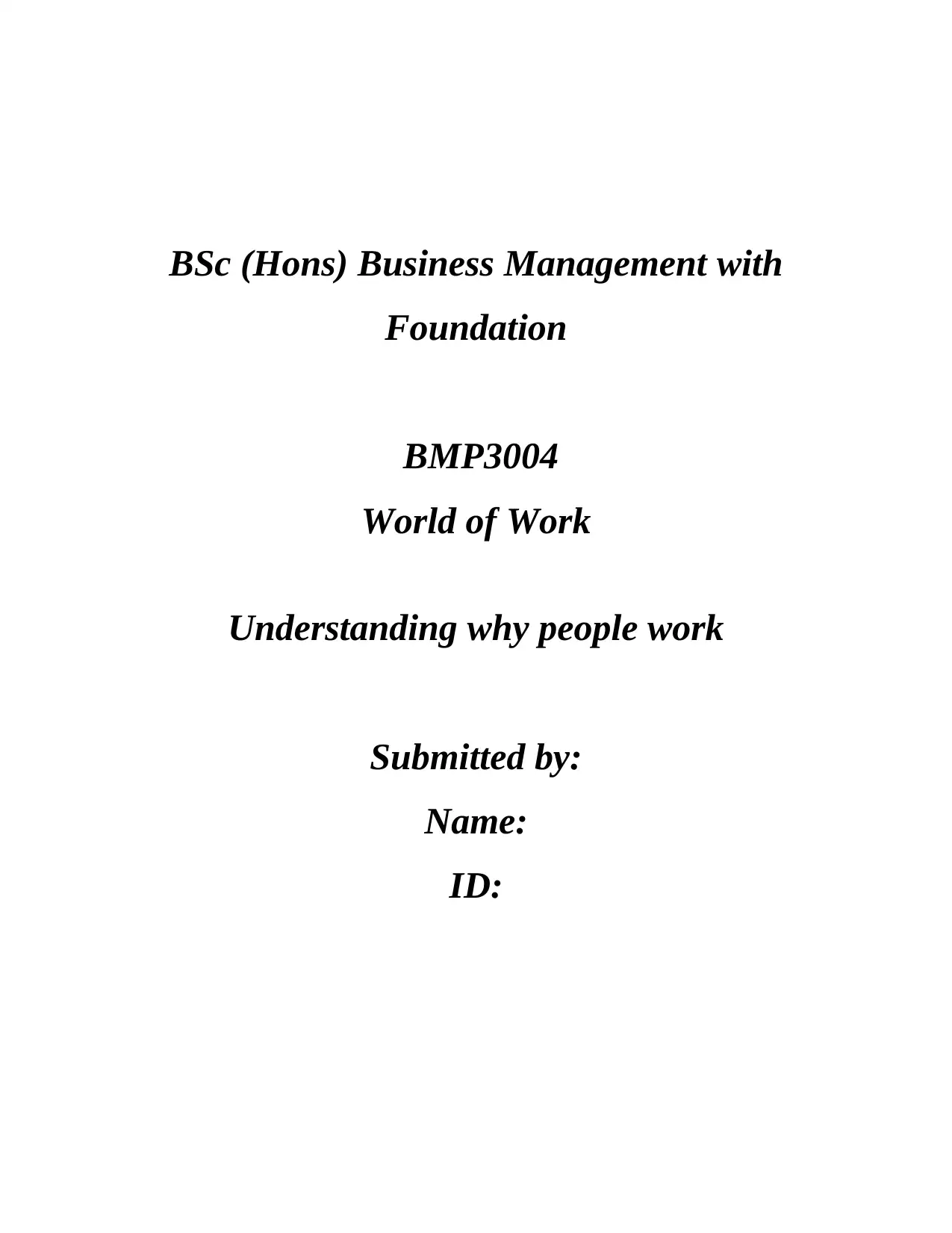
BSc (Hons) Business Management with
Foundation
BMP3004
World of Work
Understanding why people work
Submitted by:
Name:
ID:
Foundation
BMP3004
World of Work
Understanding why people work
Submitted by:
Name:
ID:
Paraphrase This Document
Need a fresh take? Get an instant paraphrase of this document with our AI Paraphraser
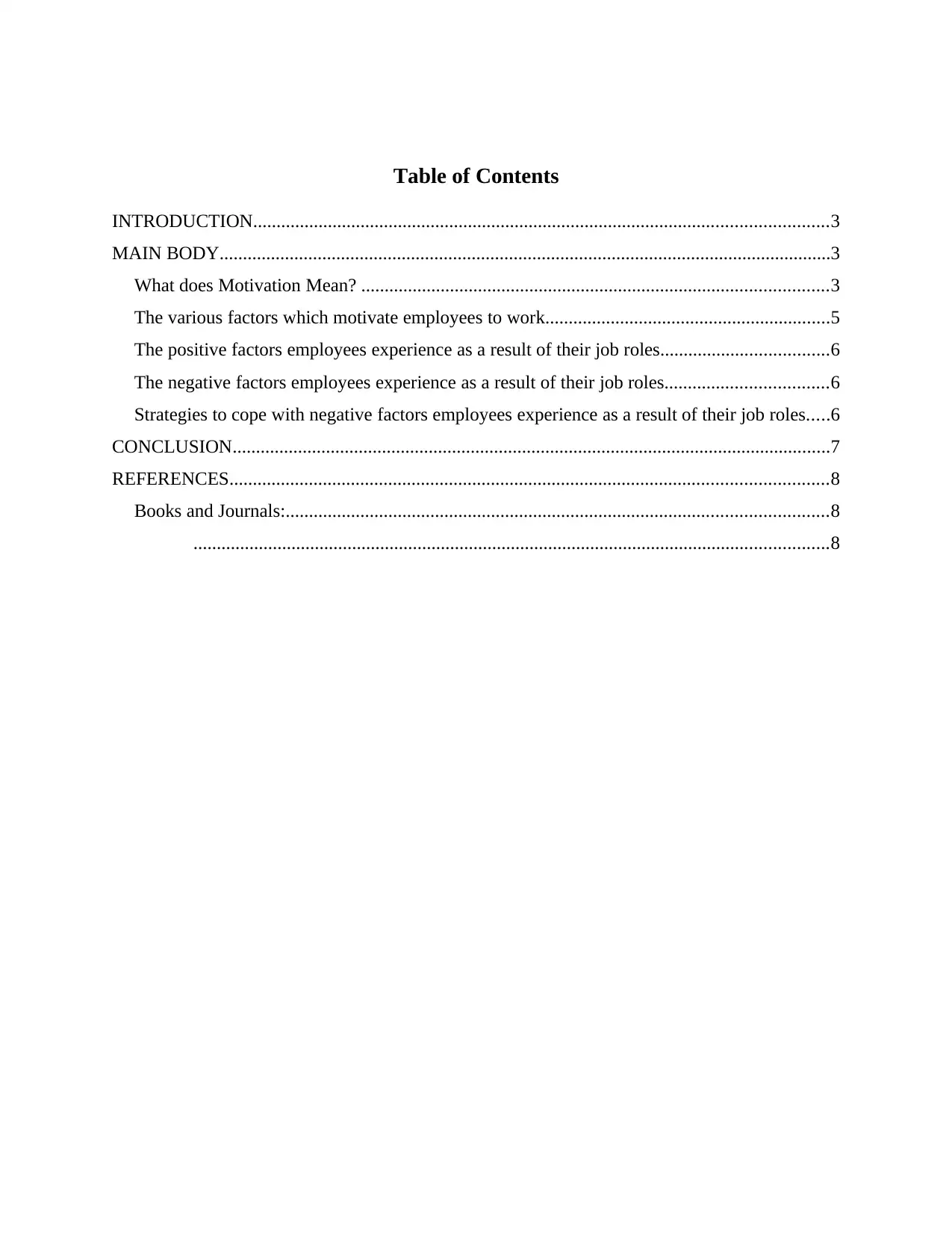
Table of Contents
INTRODUCTION...........................................................................................................................3
MAIN BODY...................................................................................................................................3
What does Motivation Mean? ....................................................................................................3
The various factors which motivate employees to work.............................................................5
The positive factors employees experience as a result of their job roles....................................6
The negative factors employees experience as a result of their job roles...................................6
Strategies to cope with negative factors employees experience as a result of their job roles.....6
CONCLUSION................................................................................................................................7
REFERENCES................................................................................................................................8
Books and Journals:....................................................................................................................8
........................................................................................................................................8
INTRODUCTION...........................................................................................................................3
MAIN BODY...................................................................................................................................3
What does Motivation Mean? ....................................................................................................3
The various factors which motivate employees to work.............................................................5
The positive factors employees experience as a result of their job roles....................................6
The negative factors employees experience as a result of their job roles...................................6
Strategies to cope with negative factors employees experience as a result of their job roles.....6
CONCLUSION................................................................................................................................7
REFERENCES................................................................................................................................8
Books and Journals:....................................................................................................................8
........................................................................................................................................8
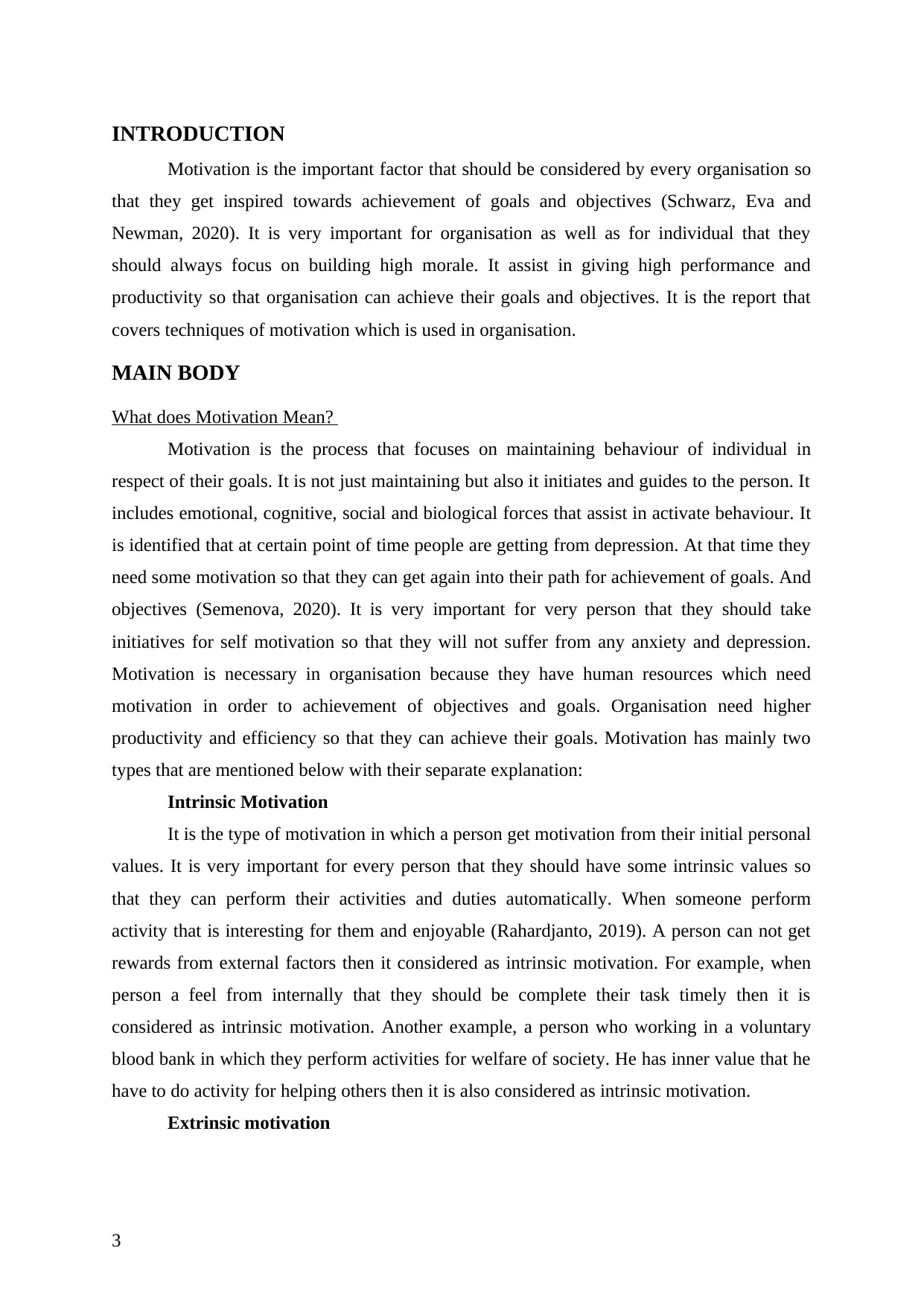
INTRODUCTION
Motivation is the important factor that should be considered by every organisation so
that they get inspired towards achievement of goals and objectives (Schwarz, Eva and
Newman, 2020). It is very important for organisation as well as for individual that they
should always focus on building high morale. It assist in giving high performance and
productivity so that organisation can achieve their goals and objectives. It is the report that
covers techniques of motivation which is used in organisation.
MAIN BODY
What does Motivation Mean?
Motivation is the process that focuses on maintaining behaviour of individual in
respect of their goals. It is not just maintaining but also it initiates and guides to the person. It
includes emotional, cognitive, social and biological forces that assist in activate behaviour. It
is identified that at certain point of time people are getting from depression. At that time they
need some motivation so that they can get again into their path for achievement of goals. And
objectives (Semenova, 2020). It is very important for very person that they should take
initiatives for self motivation so that they will not suffer from any anxiety and depression.
Motivation is necessary in organisation because they have human resources which need
motivation in order to achievement of objectives and goals. Organisation need higher
productivity and efficiency so that they can achieve their goals. Motivation has mainly two
types that are mentioned below with their separate explanation:
Intrinsic Motivation
It is the type of motivation in which a person get motivation from their initial personal
values. It is very important for every person that they should have some intrinsic values so
that they can perform their activities and duties automatically. When someone perform
activity that is interesting for them and enjoyable (Rahardjanto, 2019). A person can not get
rewards from external factors then it considered as intrinsic motivation. For example, when
person a feel from internally that they should be complete their task timely then it is
considered as intrinsic motivation. Another example, a person who working in a voluntary
blood bank in which they perform activities for welfare of society. He has inner value that he
have to do activity for helping others then it is also considered as intrinsic motivation.
Extrinsic motivation
3
Motivation is the important factor that should be considered by every organisation so
that they get inspired towards achievement of goals and objectives (Schwarz, Eva and
Newman, 2020). It is very important for organisation as well as for individual that they
should always focus on building high morale. It assist in giving high performance and
productivity so that organisation can achieve their goals and objectives. It is the report that
covers techniques of motivation which is used in organisation.
MAIN BODY
What does Motivation Mean?
Motivation is the process that focuses on maintaining behaviour of individual in
respect of their goals. It is not just maintaining but also it initiates and guides to the person. It
includes emotional, cognitive, social and biological forces that assist in activate behaviour. It
is identified that at certain point of time people are getting from depression. At that time they
need some motivation so that they can get again into their path for achievement of goals. And
objectives (Semenova, 2020). It is very important for very person that they should take
initiatives for self motivation so that they will not suffer from any anxiety and depression.
Motivation is necessary in organisation because they have human resources which need
motivation in order to achievement of objectives and goals. Organisation need higher
productivity and efficiency so that they can achieve their goals. Motivation has mainly two
types that are mentioned below with their separate explanation:
Intrinsic Motivation
It is the type of motivation in which a person get motivation from their initial personal
values. It is very important for every person that they should have some intrinsic values so
that they can perform their activities and duties automatically. When someone perform
activity that is interesting for them and enjoyable (Rahardjanto, 2019). A person can not get
rewards from external factors then it considered as intrinsic motivation. For example, when
person a feel from internally that they should be complete their task timely then it is
considered as intrinsic motivation. Another example, a person who working in a voluntary
blood bank in which they perform activities for welfare of society. He has inner value that he
have to do activity for helping others then it is also considered as intrinsic motivation.
Extrinsic motivation
3
⊘ This is a preview!⊘
Do you want full access?
Subscribe today to unlock all pages.

Trusted by 1+ million students worldwide
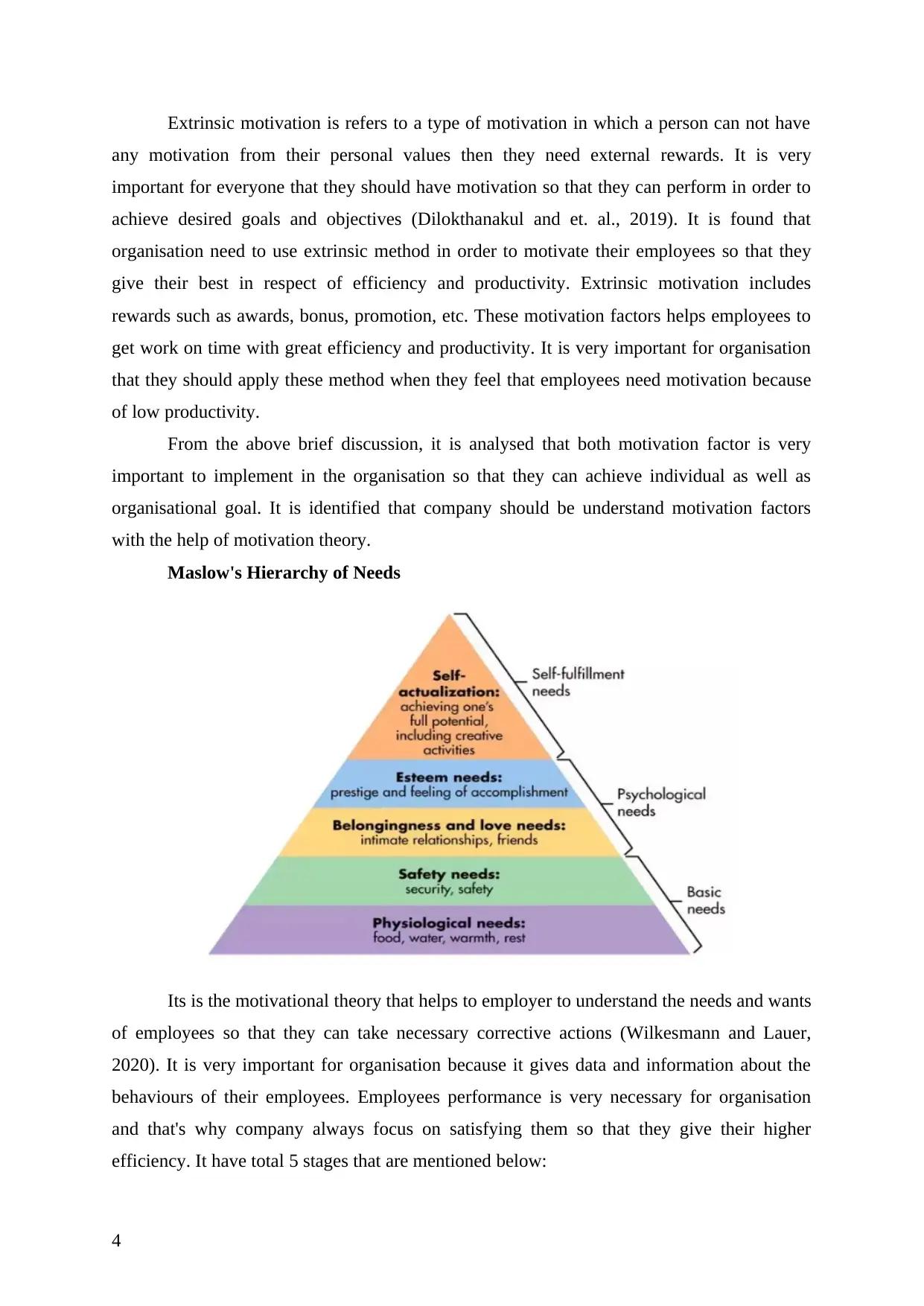
Extrinsic motivation is refers to a type of motivation in which a person can not have
any motivation from their personal values then they need external rewards. It is very
important for everyone that they should have motivation so that they can perform in order to
achieve desired goals and objectives (Dilokthanakul and et. al., 2019). It is found that
organisation need to use extrinsic method in order to motivate their employees so that they
give their best in respect of efficiency and productivity. Extrinsic motivation includes
rewards such as awards, bonus, promotion, etc. These motivation factors helps employees to
get work on time with great efficiency and productivity. It is very important for organisation
that they should apply these method when they feel that employees need motivation because
of low productivity.
From the above brief discussion, it is analysed that both motivation factor is very
important to implement in the organisation so that they can achieve individual as well as
organisational goal. It is identified that company should be understand motivation factors
with the help of motivation theory.
Maslow's Hierarchy of Needs
Its is the motivational theory that helps to employer to understand the needs and wants
of employees so that they can take necessary corrective actions (Wilkesmann and Lauer,
2020). It is very important for organisation because it gives data and information about the
behaviours of their employees. Employees performance is very necessary for organisation
and that's why company always focus on satisfying them so that they give their higher
efficiency. It have total 5 stages that are mentioned below:
4
any motivation from their personal values then they need external rewards. It is very
important for everyone that they should have motivation so that they can perform in order to
achieve desired goals and objectives (Dilokthanakul and et. al., 2019). It is found that
organisation need to use extrinsic method in order to motivate their employees so that they
give their best in respect of efficiency and productivity. Extrinsic motivation includes
rewards such as awards, bonus, promotion, etc. These motivation factors helps employees to
get work on time with great efficiency and productivity. It is very important for organisation
that they should apply these method when they feel that employees need motivation because
of low productivity.
From the above brief discussion, it is analysed that both motivation factor is very
important to implement in the organisation so that they can achieve individual as well as
organisational goal. It is identified that company should be understand motivation factors
with the help of motivation theory.
Maslow's Hierarchy of Needs
Its is the motivational theory that helps to employer to understand the needs and wants
of employees so that they can take necessary corrective actions (Wilkesmann and Lauer,
2020). It is very important for organisation because it gives data and information about the
behaviours of their employees. Employees performance is very necessary for organisation
and that's why company always focus on satisfying them so that they give their higher
efficiency. It have total 5 stages that are mentioned below:
4
Paraphrase This Document
Need a fresh take? Get an instant paraphrase of this document with our AI Paraphraser
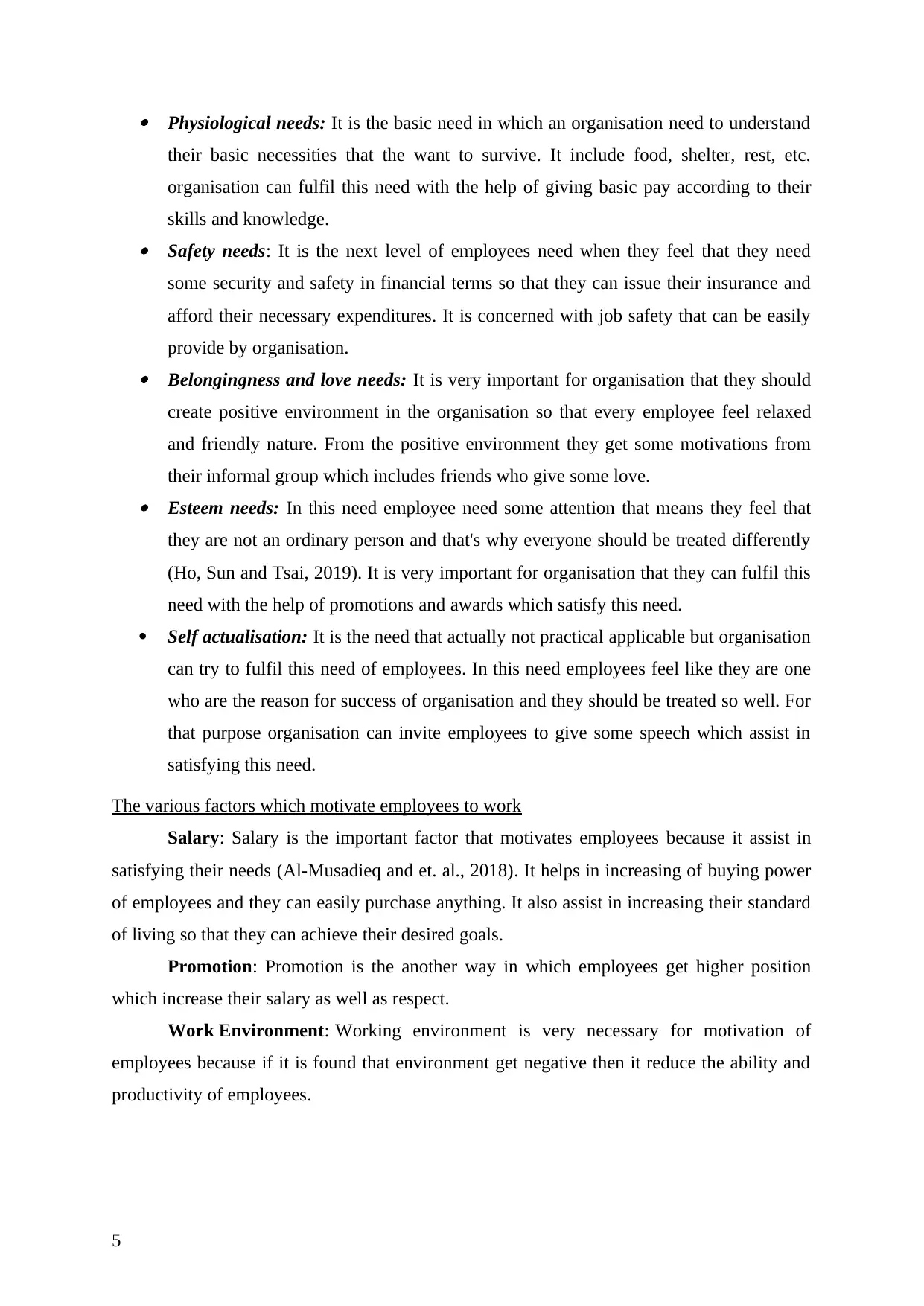
Physiological needs: It is the basic need in which an organisation need to understand
their basic necessities that the want to survive. It include food, shelter, rest, etc.
organisation can fulfil this need with the help of giving basic pay according to their
skills and knowledge. Safety needs: It is the next level of employees need when they feel that they need
some security and safety in financial terms so that they can issue their insurance and
afford their necessary expenditures. It is concerned with job safety that can be easily
provide by organisation. Belongingness and love needs: It is very important for organisation that they should
create positive environment in the organisation so that every employee feel relaxed
and friendly nature. From the positive environment they get some motivations from
their informal group which includes friends who give some love. Esteem needs: In this need employee need some attention that means they feel that
they are not an ordinary person and that's why everyone should be treated differently
(Ho, Sun and Tsai, 2019). It is very important for organisation that they can fulfil this
need with the help of promotions and awards which satisfy this need.
Self actualisation: It is the need that actually not practical applicable but organisation
can try to fulfil this need of employees. In this need employees feel like they are one
who are the reason for success of organisation and they should be treated so well. For
that purpose organisation can invite employees to give some speech which assist in
satisfying this need.
The various factors which motivate employees to work
Salary: Salary is the important factor that motivates employees because it assist in
satisfying their needs (Al-Musadieq and et. al., 2018). It helps in increasing of buying power
of employees and they can easily purchase anything. It also assist in increasing their standard
of living so that they can achieve their desired goals.
Promotion: Promotion is the another way in which employees get higher position
which increase their salary as well as respect.
Work Environment: Working environment is very necessary for motivation of
employees because if it is found that environment get negative then it reduce the ability and
productivity of employees.
5
their basic necessities that the want to survive. It include food, shelter, rest, etc.
organisation can fulfil this need with the help of giving basic pay according to their
skills and knowledge. Safety needs: It is the next level of employees need when they feel that they need
some security and safety in financial terms so that they can issue their insurance and
afford their necessary expenditures. It is concerned with job safety that can be easily
provide by organisation. Belongingness and love needs: It is very important for organisation that they should
create positive environment in the organisation so that every employee feel relaxed
and friendly nature. From the positive environment they get some motivations from
their informal group which includes friends who give some love. Esteem needs: In this need employee need some attention that means they feel that
they are not an ordinary person and that's why everyone should be treated differently
(Ho, Sun and Tsai, 2019). It is very important for organisation that they can fulfil this
need with the help of promotions and awards which satisfy this need.
Self actualisation: It is the need that actually not practical applicable but organisation
can try to fulfil this need of employees. In this need employees feel like they are one
who are the reason for success of organisation and they should be treated so well. For
that purpose organisation can invite employees to give some speech which assist in
satisfying this need.
The various factors which motivate employees to work
Salary: Salary is the important factor that motivates employees because it assist in
satisfying their needs (Al-Musadieq and et. al., 2018). It helps in increasing of buying power
of employees and they can easily purchase anything. It also assist in increasing their standard
of living so that they can achieve their desired goals.
Promotion: Promotion is the another way in which employees get higher position
which increase their salary as well as respect.
Work Environment: Working environment is very necessary for motivation of
employees because if it is found that environment get negative then it reduce the ability and
productivity of employees.
5
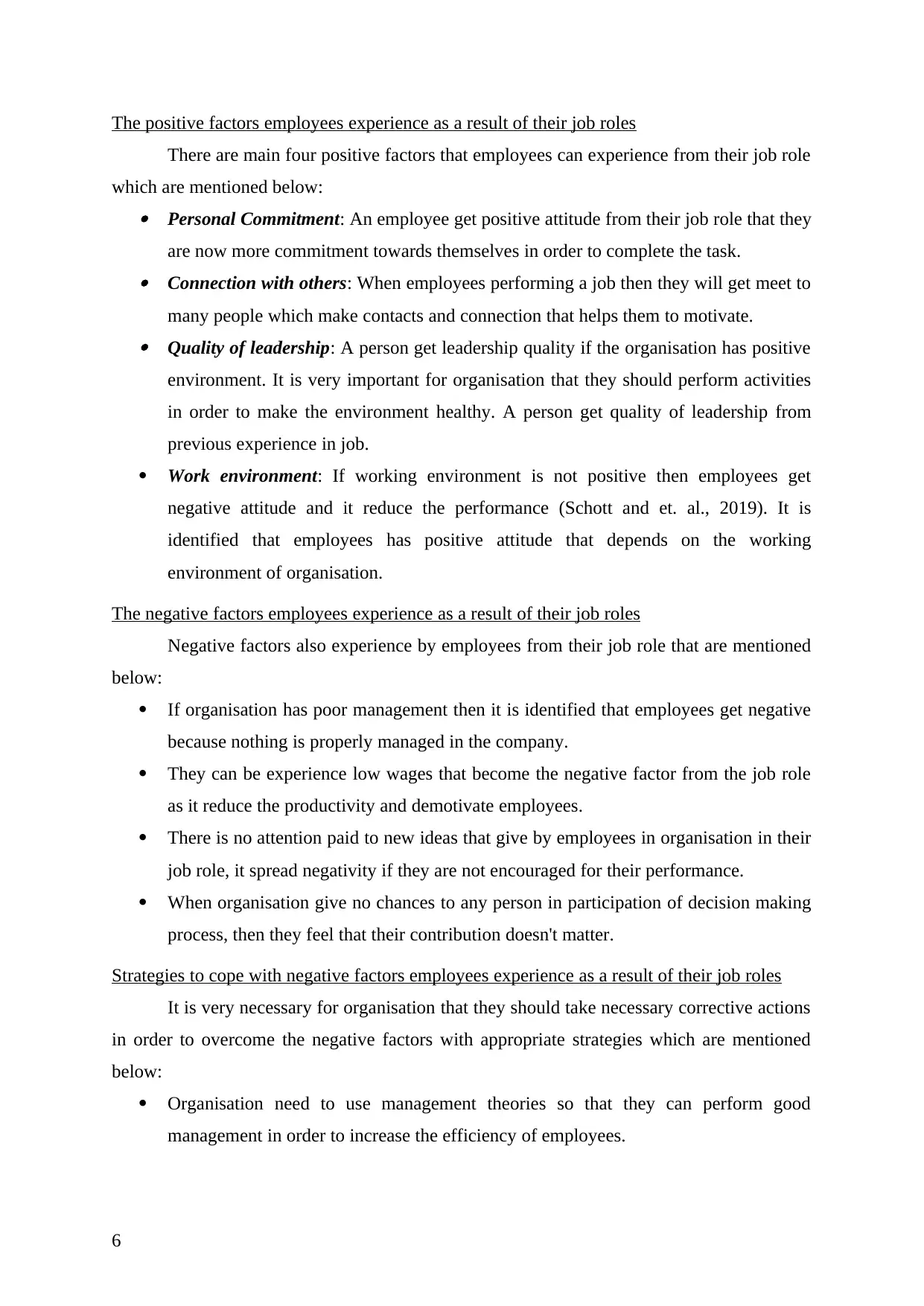
The positive factors employees experience as a result of their job roles
There are main four positive factors that employees can experience from their job role
which are mentioned below: Personal Commitment: An employee get positive attitude from their job role that they
are now more commitment towards themselves in order to complete the task. Connection with others: When employees performing a job then they will get meet to
many people which make contacts and connection that helps them to motivate. Quality of leadership: A person get leadership quality if the organisation has positive
environment. It is very important for organisation that they should perform activities
in order to make the environment healthy. A person get quality of leadership from
previous experience in job.
Work environment: If working environment is not positive then employees get
negative attitude and it reduce the performance (Schott and et. al., 2019). It is
identified that employees has positive attitude that depends on the working
environment of organisation.
The negative factors employees experience as a result of their job roles
Negative factors also experience by employees from their job role that are mentioned
below:
If organisation has poor management then it is identified that employees get negative
because nothing is properly managed in the company.
They can be experience low wages that become the negative factor from the job role
as it reduce the productivity and demotivate employees.
There is no attention paid to new ideas that give by employees in organisation in their
job role, it spread negativity if they are not encouraged for their performance.
When organisation give no chances to any person in participation of decision making
process, then they feel that their contribution doesn't matter.
Strategies to cope with negative factors employees experience as a result of their job roles
It is very necessary for organisation that they should take necessary corrective actions
in order to overcome the negative factors with appropriate strategies which are mentioned
below:
Organisation need to use management theories so that they can perform good
management in order to increase the efficiency of employees.
6
There are main four positive factors that employees can experience from their job role
which are mentioned below: Personal Commitment: An employee get positive attitude from their job role that they
are now more commitment towards themselves in order to complete the task. Connection with others: When employees performing a job then they will get meet to
many people which make contacts and connection that helps them to motivate. Quality of leadership: A person get leadership quality if the organisation has positive
environment. It is very important for organisation that they should perform activities
in order to make the environment healthy. A person get quality of leadership from
previous experience in job.
Work environment: If working environment is not positive then employees get
negative attitude and it reduce the performance (Schott and et. al., 2019). It is
identified that employees has positive attitude that depends on the working
environment of organisation.
The negative factors employees experience as a result of their job roles
Negative factors also experience by employees from their job role that are mentioned
below:
If organisation has poor management then it is identified that employees get negative
because nothing is properly managed in the company.
They can be experience low wages that become the negative factor from the job role
as it reduce the productivity and demotivate employees.
There is no attention paid to new ideas that give by employees in organisation in their
job role, it spread negativity if they are not encouraged for their performance.
When organisation give no chances to any person in participation of decision making
process, then they feel that their contribution doesn't matter.
Strategies to cope with negative factors employees experience as a result of their job roles
It is very necessary for organisation that they should take necessary corrective actions
in order to overcome the negative factors with appropriate strategies which are mentioned
below:
Organisation need to use management theories so that they can perform good
management in order to increase the efficiency of employees.
6
⊘ This is a preview!⊘
Do you want full access?
Subscribe today to unlock all pages.

Trusted by 1+ million students worldwide
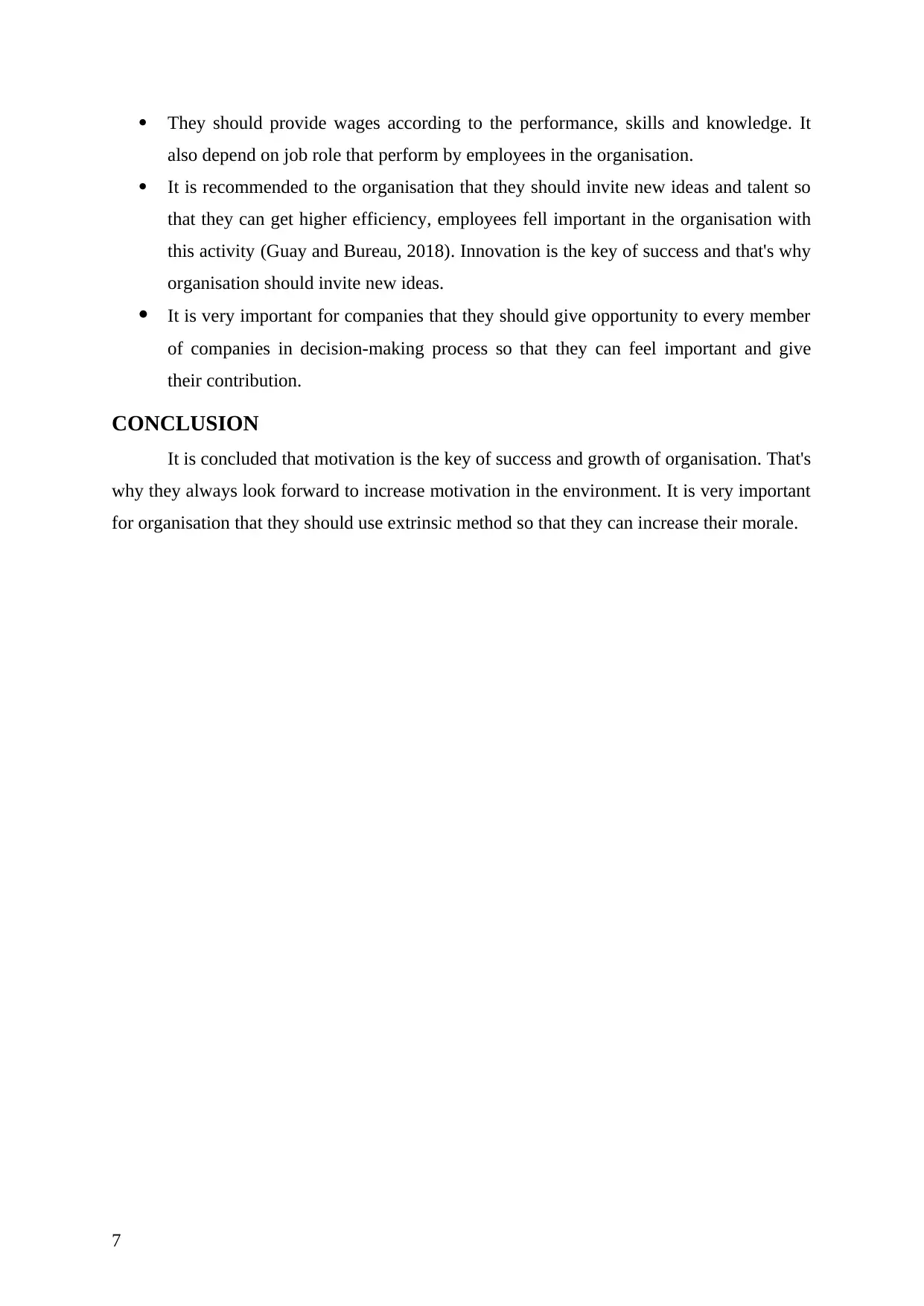
They should provide wages according to the performance, skills and knowledge. It
also depend on job role that perform by employees in the organisation.
It is recommended to the organisation that they should invite new ideas and talent so
that they can get higher efficiency, employees fell important in the organisation with
this activity (Guay and Bureau, 2018). Innovation is the key of success and that's why
organisation should invite new ideas.
It is very important for companies that they should give opportunity to every member
of companies in decision-making process so that they can feel important and give
their contribution.
CONCLUSION
It is concluded that motivation is the key of success and growth of organisation. That's
why they always look forward to increase motivation in the environment. It is very important
for organisation that they should use extrinsic method so that they can increase their morale.
7
also depend on job role that perform by employees in the organisation.
It is recommended to the organisation that they should invite new ideas and talent so
that they can get higher efficiency, employees fell important in the organisation with
this activity (Guay and Bureau, 2018). Innovation is the key of success and that's why
organisation should invite new ideas.
It is very important for companies that they should give opportunity to every member
of companies in decision-making process so that they can feel important and give
their contribution.
CONCLUSION
It is concluded that motivation is the key of success and growth of organisation. That's
why they always look forward to increase motivation in the environment. It is very important
for organisation that they should use extrinsic method so that they can increase their morale.
7
Paraphrase This Document
Need a fresh take? Get an instant paraphrase of this document with our AI Paraphraser
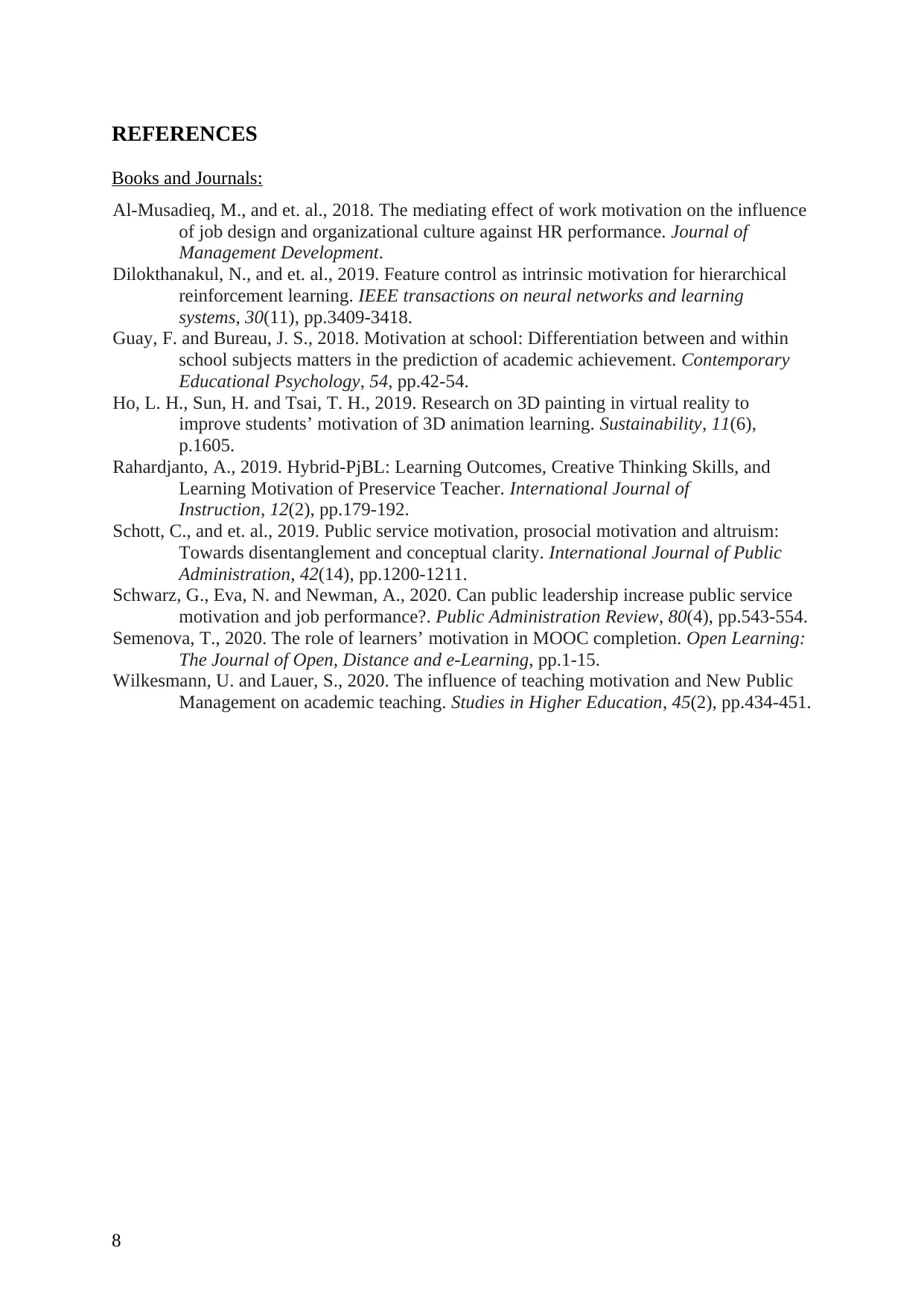
REFERENCES
Books and Journals:
Al-Musadieq, M., and et. al., 2018. The mediating effect of work motivation on the influence
of job design and organizational culture against HR performance. Journal of
Management Development.
Dilokthanakul, N., and et. al., 2019. Feature control as intrinsic motivation for hierarchical
reinforcement learning. IEEE transactions on neural networks and learning
systems, 30(11), pp.3409-3418.
Guay, F. and Bureau, J. S., 2018. Motivation at school: Differentiation between and within
school subjects matters in the prediction of academic achievement. Contemporary
Educational Psychology, 54, pp.42-54.
Ho, L. H., Sun, H. and Tsai, T. H., 2019. Research on 3D painting in virtual reality to
improve students’ motivation of 3D animation learning. Sustainability, 11(6),
p.1605.
Rahardjanto, A., 2019. Hybrid-PjBL: Learning Outcomes, Creative Thinking Skills, and
Learning Motivation of Preservice Teacher. International Journal of
Instruction, 12(2), pp.179-192.
Schott, C., and et. al., 2019. Public service motivation, prosocial motivation and altruism:
Towards disentanglement and conceptual clarity. International Journal of Public
Administration, 42(14), pp.1200-1211.
Schwarz, G., Eva, N. and Newman, A., 2020. Can public leadership increase public service
motivation and job performance?. Public Administration Review, 80(4), pp.543-554.
Semenova, T., 2020. The role of learners’ motivation in MOOC completion. Open Learning:
The Journal of Open, Distance and e-Learning, pp.1-15.
Wilkesmann, U. and Lauer, S., 2020. The influence of teaching motivation and New Public
Management on academic teaching. Studies in Higher Education, 45(2), pp.434-451.
8
Books and Journals:
Al-Musadieq, M., and et. al., 2018. The mediating effect of work motivation on the influence
of job design and organizational culture against HR performance. Journal of
Management Development.
Dilokthanakul, N., and et. al., 2019. Feature control as intrinsic motivation for hierarchical
reinforcement learning. IEEE transactions on neural networks and learning
systems, 30(11), pp.3409-3418.
Guay, F. and Bureau, J. S., 2018. Motivation at school: Differentiation between and within
school subjects matters in the prediction of academic achievement. Contemporary
Educational Psychology, 54, pp.42-54.
Ho, L. H., Sun, H. and Tsai, T. H., 2019. Research on 3D painting in virtual reality to
improve students’ motivation of 3D animation learning. Sustainability, 11(6),
p.1605.
Rahardjanto, A., 2019. Hybrid-PjBL: Learning Outcomes, Creative Thinking Skills, and
Learning Motivation of Preservice Teacher. International Journal of
Instruction, 12(2), pp.179-192.
Schott, C., and et. al., 2019. Public service motivation, prosocial motivation and altruism:
Towards disentanglement and conceptual clarity. International Journal of Public
Administration, 42(14), pp.1200-1211.
Schwarz, G., Eva, N. and Newman, A., 2020. Can public leadership increase public service
motivation and job performance?. Public Administration Review, 80(4), pp.543-554.
Semenova, T., 2020. The role of learners’ motivation in MOOC completion. Open Learning:
The Journal of Open, Distance and e-Learning, pp.1-15.
Wilkesmann, U. and Lauer, S., 2020. The influence of teaching motivation and New Public
Management on academic teaching. Studies in Higher Education, 45(2), pp.434-451.
8
1 out of 8
Related Documents
Your All-in-One AI-Powered Toolkit for Academic Success.
+13062052269
info@desklib.com
Available 24*7 on WhatsApp / Email
![[object Object]](/_next/static/media/star-bottom.7253800d.svg)
Unlock your academic potential
Copyright © 2020–2026 A2Z Services. All Rights Reserved. Developed and managed by ZUCOL.


